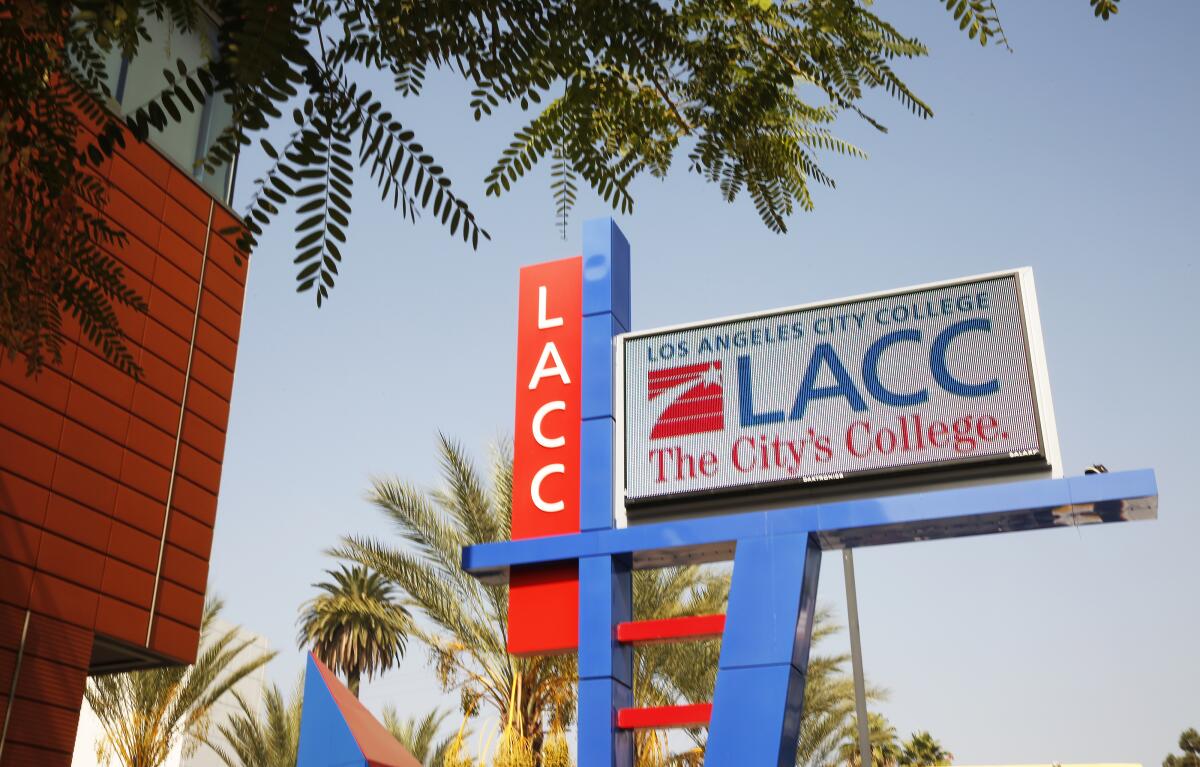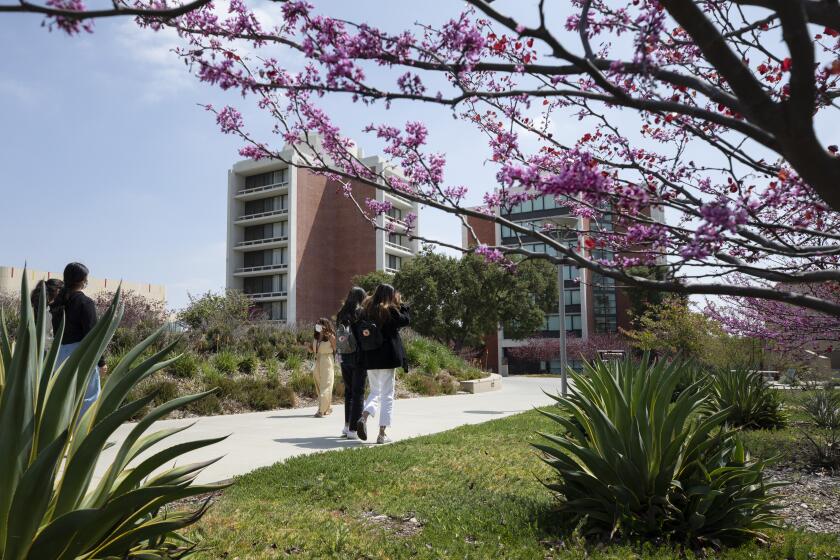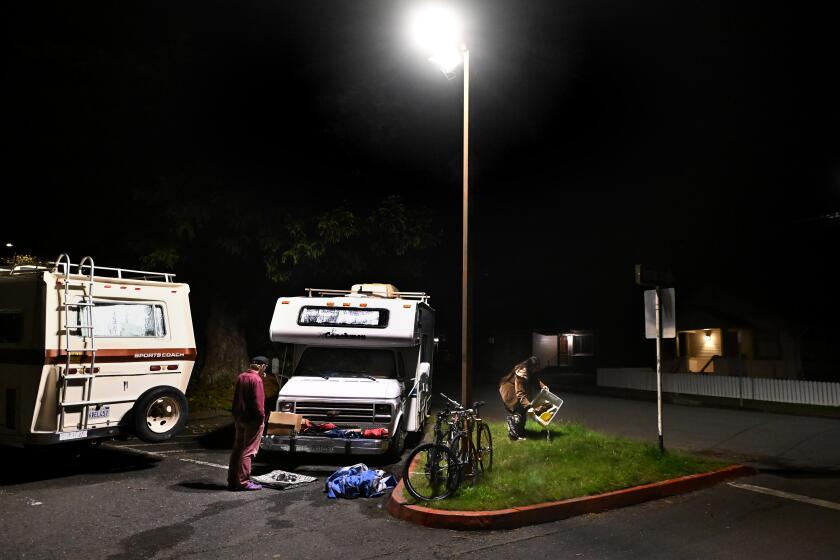Community colleges deserve more love from higher-ed mega-donors

- Share via
Between lectures on Native American languages and an archaeological spelunking expedition last fall, I chatted with the fellow student sitting next to me. I knew him a bit from my Intro to Archaeology class, my one course at Palomar College, a community college in north San Diego County.
I loved the way the class opened my mind to big new questions about culture and the environment, but it wasn’t a course you could skate through. The homework included dense readings, videos and two online quizzes. There also were two midterms, a final exam and a paper.
“It’s a lot because I have a full-time job,” I said. “I do, too,” he answered. He works as a chef 50 hours a week — and, unlike me, was carrying a full load of four courses.
Legacy admission is on the wane but colleges are doubling down on early decision, another admissions practice that favor the wealthy.
I shouldn’t have been surprised. I’d already met students at Palomar who, in addition to full course loads, had full-time jobs such as working for the military or as a fitness instructor. Community college might be low-cost, but there are living expenses to meet, pricey textbooks to purchase and sometimes families to support. The college helps where it can, encouraging students to apply for public scholarships and connecting them with other financial aid sources. Unlike at the two four-year colleges I attended in much younger days, Palomar College staff are amazingly quick and responsive to student inquiries, whether in person, by phone or email.
As a journalist, I’ve covered community colleges for decades — the high dropout rates, the students who arrive uncertain about why they’re in college, and too often unprepared for college-level work. Those issues are still there, as well as students in need of guidance and extra help finding a path to a decent future. But returning to college at Palomar last year made it obvious that the picture is far more complicated. The students I’ve met are determined, energetic, curious and highly disciplined. When they reach their goals of earning a certificate or degree or getting accepted to a four-year university or grad school, they are likely to have more maturity and experience than students who lived in dorms at a private college for four years.
The strife on campuses over the Israel-Gaza war comes amid a culture of outrage over issues. Universities should convene open discussion, not take sides.
So when billionaires squawk about how they don’t want their multimillion-dollar donations going to the likes of Harvard or the University of Pennsylvania because of perceived antisemitism, I can’t help thinking: “I can fix this for you! Instead of forking all that money over to institutions with massive endowments, how about using even half of it to help these unsung colleges educate 9 million undergraduates every year? How about giving private scholarship assistance to community college students so maybe they could get by with just a half-time job on top of their full course load?”
Bill Ackman, who led the charge against former Harvard President Claudine Gay, is the most vocal and visible of the super-wealthy to press Harvard on the antisemitism issue. But the tens of millions of dollars he has donated over the years hardly make him the biggest of the unhappy donors. Billionaire businessman Len Blavatnik paused his Harvard donations, which already had amounted to $270 million. Hedge fund CEO Ken Griffin has lavished more than $450 million on Harvard, and said that though he deplores some of the anti-Israel rhetoric on campus, he will continue to donate.
Meanwhile, University of Pennsylvania donor Ross Stevens threatened to rescind a $100-million gift.
Complaints of antisemitism and Islamophobia on campus have skyrocketed. Figuring out when speech is protected or violating the rights of others is no easy task.
The debate rages on about the strife on many U.S. campuses after the brutal Oct. 7 Hamas attack on Israel and retaliation that has taken more than 25,000 Palestinian lives. The donors’ involvement also raises important questions about the mega-influence of mega-donors.
These are legitimate issues to discuss. But so is the tremendous gap in opportunity between students at elite schools, where donations fund prestigious chairs and build impressive structures, and students at community colleges who could contribute every bit as much to society as an Ivy League grad, given half the chance.
Educational wealth in this country is largely generational: People who attend prestigious colleges are more likely to get wealthy in part because of access to educational opportunities and alumni and other exclusive networks. And then they continue the cycle by giving to their alma mater. The wealth stays within the club.
Homeless college students who live in their cars need safe overnight parking. How tough can that be?
Colleges such as Cal Poly Humboldt resist allowing overnight parking for students who live out of their cars. Long Beach City College shows a better way.
In contrast, Cypress College in Orange County announced its biggest-ever donation in October: $1.2 million for its aviation program. That’s great, but barely a drop compared with the need.
One billionaire exception has been MacKenzie Scott, Amazon co-founder and ex-wife of Jeff Bezos. In 2021, she gave unrestricted gifts of $20 million to $50 million each to 35 tribal and historically Black colleges, community colleges and other underappreciated schools. Similar amounts from Scott have gone to several Cal State campuses and California community colleges.
And in 2020, a donation of $100 million from the Jay Pritzker Foundation went to the state’s community college system for scholarships to help its nearly 2 million students.
We need more donors like these — philanthropists who pull their attention out of the narrow trenches of prestigious universities (Scott earned her bachelor’s at Princeton) and look at all the places where their largesse could do more to change the trajectory of determined and deserving scholars.
More to Read
A cure for the common opinion
Get thought-provoking perspectives with our weekly newsletter.
You may occasionally receive promotional content from the Los Angeles Times.














